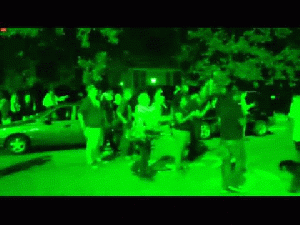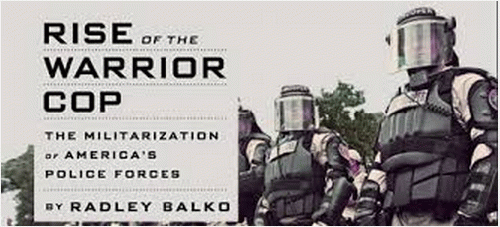This transcript series was originally published in November 2013. It is totally relevant to what's happening in Ferguson.
Rob Kall: Welcome to the Rob Kall Bottom Up Radio Show on the NJC1360 AM, out of Washington Township reaching metro Philly and South Jersey sponsored by, Opednews.com. That's progressive news and opinion, just Google progressive opinion and Oped news comes up at the top. Check us out. My guest tonight is Radley Balko, he's the author of Rise of the Warrior Cop: The Militarization of America's Police Forces. He's a senior writer and investigative reporter for the Huffington Post, where he covers civil liberties and the criminal justice system. Radley, welcome to the show.
Radley Balko: Thanks for having me on, glad to be here.
Rob Kall: So, you've got a really powerful book here, with statistics and stories that are frightening. They're terrifying really. Let's start by you telling a story that exemplifies what this book is all about.
Radley Balko: Sure, I'm actually going to take a story that's not in the book, that didn't make the final edit, but that I do think is, is emblematic of all of the problems that I, that I outline in the book.
This is a story about Katherine Johnson, who is a ninety two year old woman, who lived in a bad neighborhood in Atlanta. And this all started right around Thanksgiving in the year 2006. There was an Atlanta narcotics team out, on patrol, or sort of driving around. And they saw a guy walking alongside the road that they'd arrested before on various charges, knew he had a record. So they jump out on this guy, they throw him to the ground. We found out later that they had, ended up actually planting a bag of marijuana on him. He knew he had a record, they knew he had a record, so they tell him they'll let him go if he can tell them where they can find a large supply of drugs. So he basically just makes up an address in the neighborhood. And that address happened to be the address of Katherine Johnson.
Now what's supposed to happen at this point, is the police are supposed to get a confidential informant to go do what they call a controlled drug find. The informant will wear a wire, and they give him a bunch of marked bills, and he's supposed to go to this house, buy some drugs, and at that point they apply for a search warrant.
They didn't do that. Instead, I should add I guess, that that, that process would take a day and a half, two days. But they wanted to get there quicker. So they lied, they lied on the affidavit, they claimed that they had made a controlled buy with an informant when they actually hadn't. And instead of waiting a couple days, they got their warrant signed within a few hours.
So later that evening they start trying to break in to this woman's home. As I said this was a bad neighborhood, so had put bars on her doors, so it took them awhile to get in. by the time they got in she was standing in the living room, holding a rusty revolver that she kept by her bed to scare people off. The gun actually didn't work, she just waved it at people, when she wanted them, when she was frightened.
The police break down the door, she's standing there, they open fire, they kill her. They initially claim that she fired first, we now know that wasn't true because the gun wasn't functional. And two officers were wounded by, gun fire from other officers. They called ambulances to come and treat those officers. They did not call an ambulance to come and treat Katherine Johnson. Instead they let her, handcuffed her, and let her bleed to death on her living room floor, while one of the officers went down to the basement to plant some marijuana. To make her look like the drug dealer that they claimed she was.
Of course now they have a problem, they have to find an informant who will lie, and say that he was the informant named in the search warrant. So they go after this guy that they had used in the past, they put him in a police car. Informants are pretty shady people most of the time, they tend to be addicts or rival drug dealers. To this guy credit, to this guy's credit, he wouldn't play along. He, there's actually this remarkable phone call that he made from the back of an APD cruiser, where he calls 911, immediately asks to speak to the FBI. Which you can't do through 911. But he says, you know, "They're trying to make me say that I helped kill that old lady, and, and I don't want any part of it".
At this point, he jumps out of the car and starts to flee. The officers chase him. And there's actually a foot chase through downtown Atlanta. Through, you know, a hotel lobby or two, businesses. Finally this guy finds a phone, he was working with the ATF at the same time. Calls his ATF agent who swoops in and picks him up and puts him up at a hotel out in the suburbs.
At this point they open up a federal investigation. And what the federal investigation found was that this was rampant in the Atlanta Narcotics Unit, of the Atlanta Police Department. That there was lots of lying on search warrants, that there were lots of raids on the wrong houses. A, the Atlanta City Council later held hearings, and dozens of people came forward to say that, "Yeah this has happened to me too". In fact they had raided another woman who was on the same block, who was in her eighties, who also kept a gun by her bed to scare people off. They managed to hold their fire in that case.
But what the federal investigation found was that, that these narcotic officers had quotas. They had to arrest so many people each month, they had to seize a minimum quantity of drugs each month. And, you know, what we now know, what's pretty obvious now, is that those quota's came because, like every other police department in the country, the Atlanta Police Department was competing for a limited amount of federal resources that go towards anti-drug policing.
So, the police department is facing pressure to enhance revenue by getting its hands on this federal funding. It passes the pressures then on to the police officers, whose careers are, job evaluations and promotions and careers depend on meeting this quotas, or exceeding them. And so all of this was basically resulted, resulting in these mass constitutional violations.
The entire narcotics units was in a pinch, they were fired or replaced, or transferred to another department and replaced. And there were some promises for reform, though most of them didn't pan out.
Now you could argue that, you know, Atlanta was the only police department in the country where this was going on. And they just happened to be the only one that got, the one who got caught. But you know these federal incentives are for every police department in the country. And, you know they, people tend to respond to incentives in the same way. But I, you know, I would guess that this is happening in far more police departments than just in Atlanta. In fact we have other cases studies showing that it has.
Next Page 1 | 2 | 3 | 4 | 5 | 6
(Note: You can view every article as one long page if you sign up as an Advocate Member, or higher).







